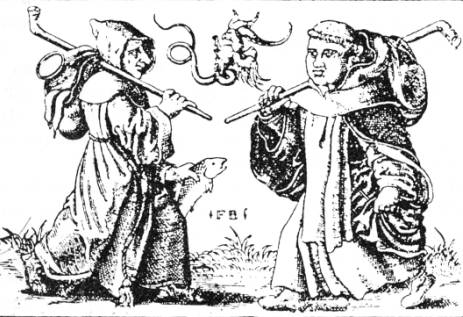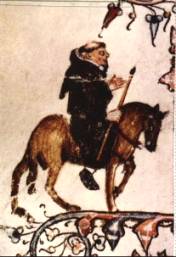
Centre for Dominican Studies of Dacia
Monks on the Move
- Religious travelling in and from Medieval Scandinavia
Presentation of session held at the International Medieval Congress (IMC) in Leeds 12-15 July 2010.

Sponsor: Centre for Dominican Studies of Dacia / Nordic Centre for Medieval Studies.
Organiser: Johnny Grandjean Gøgsig Jakobsen, Nordisk Forskningsinstitut, Københavns Universitet.
Moderator/Chair: Bertil Nilsson, Institutionen för litteratur, idéhistoria & religion, Göteborgs universitet.
Session abstract
The session aims to look at the importance of those within the regular clergy, who did not follow the ideal of stabilitas loci, but in stead through travelling maintained contact between their home convent and the surrounding world in various ways. The selected papers will show how Hospitallers of St John connected Scandinavia to the Mediterranean, how Dominican university students helped transmit cultural ideas to the North, and how an important part of Mendicant life was to travel around the countryside as itinerant preachers. Together, the papers should bring us well around different types of monastic mobility and their possible influences on medieval Scandinavian society.
Christer Carlsson, Institut for Historie, Kultur & Samfundsbeskrivelse, Syddansk Universitet.
As
members of an international Military Order the Hospitallers frequently went on
educational- or business-trips all over the European continent. The Scandinavian
brethren were no exceptions and in the preserved written sources we can find
several examples of Scandinavian Hospitallers travelling to, or working in,
other Christian countries. The earliest examples of such travels can be found in
sources dating from the 14th-century, but from the 15th-century
onwards we can find several examples of Hospitallers leaving their
home-countries to study or work on the Continent. Some Hospitallers left
Scandinavia to work with internal matters of importance for their Order, while
other brethren simply went away to teach or to study at prestigious universities
on the Continent. Many of these medieval travellers turned back to Scandinavia
with fantastic stories about miracles, great buildings and other important
events which they had experienced on their travels.
Johannes Schütz, Graduiertenkolleg "Expertenkulturen des 12. bis 16.
Jahrhunderts", Georg-August-Universität Göttingen.
The
aim of the Dominican way of life was to preach and this preaching activity
should be founded by intensive studies. Thus, the Friars Preachers built a
network of schools distributed throughout Europe and instructed their teachers
in the European centre – at Paris, Oxford and Cologne. When they finished
their education, the Dominicans returned to their Scandinavian homelands to
spread their knowledge there. My paper aims at presenting these travel
activities in connection with studies of medieval Dominicans from Scandinavia. I
want to show the routeings, goals and purposes of their voyages.
Johnny
Grandjean Gøgsig Jakobsen, Nordisk Forskningsinstitut, Københavns Universitet.
Mendicant
friars were not in the same way as their clerical colleagues of the old monastic
orders tied up by a vow of stabilitas loci.
Within the orders’ provinces, the individual friars were transferred regularly
among the convents. Their main tasks were to preach the gospels and collect alms
for the convent, but even though the priories almost always were situated within
the urban centres, a number of recent studies have shown that pastoral care of
the rural countryside, the terminatione,
played a much more significant role in Dominican and Franciscan life in Northern
Europe than often portrayed by later historians. This is perhaps especially
evident in Scandinavia, where the medieval towns were of a very limited size. In
my paper, I will present examples of Mendicant terminatione
in Scandinavia, trying to establish the extent and the importance of this mobile
monastic behaviour.

Centre
for Dominican Studies of Dacia
Johnny
G.G. Jakobsen, Department of Scandinavian Research, University of Copenhagen
Postal address: Njalsgade 136, DK-2300 Copenhagen, Denmark ● Email: jggj@hum.ku.dk